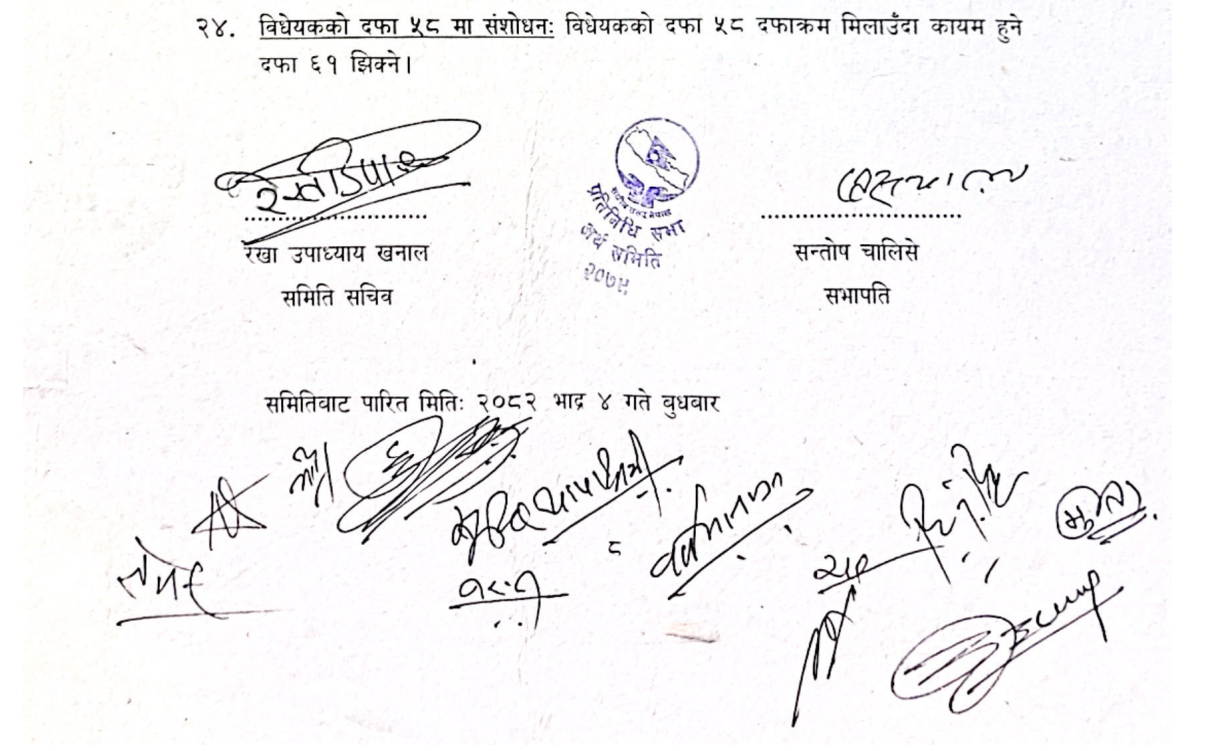The House of Representatives’ Finance Committee has introduced a new practice of having lawmakers also sign the committee’s reports on bills.
The committee included the signatures of its members in the bill concerning provisions for the mobilization of alternative development financing. Previously, only the committee chairperson and secretary signed such reports.
According to the committee secretariat, the bill carries the signatures of 14 lawmakers, including the chairperson.
Earlier, when serious errors were found in the provision on cooling-off period included in the Federal Civil Service Bill, the parliamentary probe committee formed to investigate the matter had held the committee chairperson and secretary accountable as the signatories.
Within the Parliament Secretariat, the view emerged that reports should not be prepared excluding the lawmakers who were directly involved in drafting the bill.
Finance Committee Secretary Rekha Upadhyaya told Setopati that lawmakers were made signatories in line with the recommendations of the special parliamentary probe committee.
“Based on the committee’s recommendation and the lawmakers’ wishes, everyone’s signatures were included in the committee’s report,” Secretary Upadhyaya said. “Since one of our committee members was also part of the special parliamentary probe committee, we adopted this method.”
Narayan Prasad Acharya, a CPN-UML lawmaker in the committee, had served as a member of the parliamentary probe committee on the cooling-off period issue.
The probe committee, led by Nepali Congress lawmaker Jeevan Pariyar, had suggested “making the signatures of all committee members mandatory in final reports to ensure accountability and consensus.”
Earlier, the Education, Health, and Information Technology Committee of the House of Representatives had also begun reforms in the lawmaking process.
For the first time, the committee integrated its report with the bill itself and distributed a consolidated draft of the proposed law to lawmakers.
Previously, only the report was distributed within a committee, covering only issues such as which clauses to add or remove. But the committee provided lawmakers with the draft text of the bill illustrating how it would actually look like after adding or removing certain clauses.
Education, Health, and Information Technology Committee Secretary Dasharath Dhamala said the integrated draft was prepared and distributed so that errors could be corrected and lawmakers could easily read the text.
“We have reviewed the bill very carefully to avoid mistakes. Still, errors can occur unintentionally, and this process allows space for correction,” Dhamala said during a committee meeting. “Discussions on the bill stretched over a long period, and even we tend to forget some issues. Decisions made earlier might feel unfamiliar later. So, we have consolidated all issues from the report into the main text and prepared an integrated draft.”
The probe committee led by Pariyar, formed to investigate the errors in the Federal Civil Service Bill, had also concluded that the lack of an integrated review process was one of the causes of the mistakes.
“The errors occurred because the system of consolidating the committee’s report, which included additional provisions related to the cooling-off period, with the main bill (Keeling Schedule) was not in place when the House of Representatives passed the report,” the probe committee stated in its findings.
In its recommendation to the House, the committee noted that the British parliamentary practice of consolidating the main bill with the committee’s report for review and study had proven useful, and suggested that such a system should be introduced in Nepal as well.

